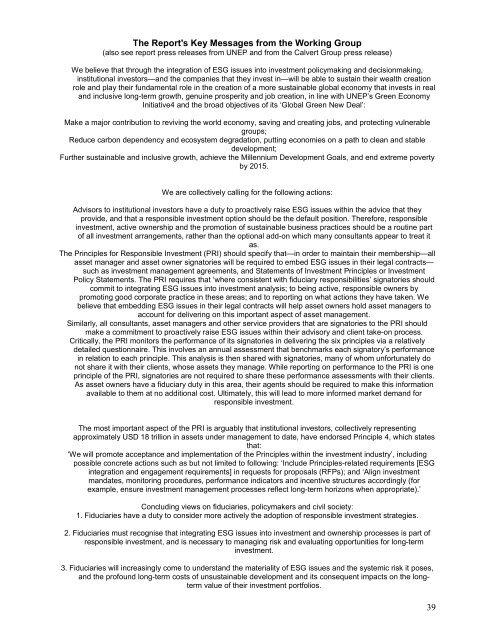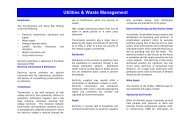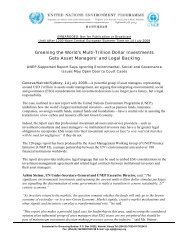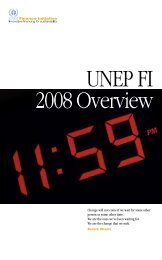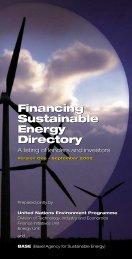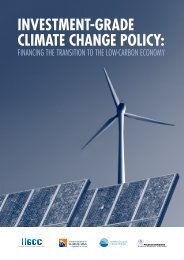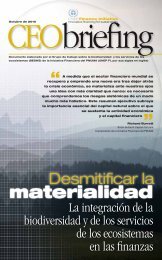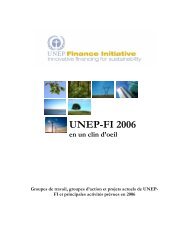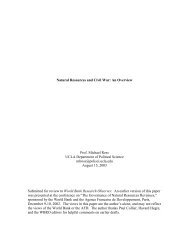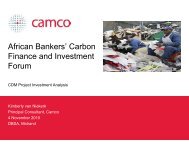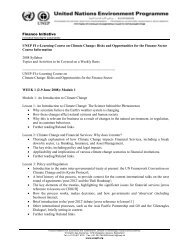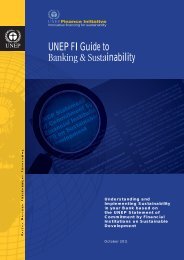UNEP FI Asset Management Working Group The - UNEP Finance ...
UNEP FI Asset Management Working Group The - UNEP Finance ...
UNEP FI Asset Management Working Group The - UNEP Finance ...
You also want an ePaper? Increase the reach of your titles
YUMPU automatically turns print PDFs into web optimized ePapers that Google loves.
<strong>The</strong> Report's Key Messages from the <strong>Working</strong> <strong>Group</strong><br />
(also see report press releases from <strong>UNEP</strong> and from the Calvert <strong>Group</strong> press release)<br />
We believe that through the integration of ESG issues into investment policymaking and decisionmaking,<br />
institutional investors—and the companies that they invest in—will be able to sustain their wealth creation<br />
role and play their fundamental role in the creation of a more sustainable global economy that invests in real<br />
and inclusive long-term growth, genuine prosperity and job creation, in line with <strong>UNEP</strong>’s Green Economy<br />
Initiative4 and the broad objectives of its ‘Global Green New Deal’:<br />
Make a major contribution to reviving the world economy, saving and creating jobs, and protecting vulnerable<br />
groups;<br />
Reduce carbon dependency and ecosystem degradation, putting economies on a path to clean and stable<br />
development;<br />
Further sustainable and inclusive growth, achieve the Millennium Development Goals, and end extreme poverty<br />
by 2015.<br />
We are collectively calling for the following actions:<br />
Advisors to institutional investors have a duty to proactively raise ESG issues within the advice that they<br />
provide, and that a responsible investment option should be the default position. <strong>The</strong>refore, responsible<br />
investment, active ownership and the promotion of sustainable business practices should be a routine part<br />
of all investment arrangements, rather than the optional add-on which many consultants appear to treat it<br />
as.<br />
<strong>The</strong> Principles for Responsible Investment (PRI) should specify that—in order to maintain their membership—all<br />
asset manager and asset owner signatories will be required to embed ESG issues in their legal contracts—<br />
such as investment management agreements, and Statements of Investment Principles or Investment<br />
Policy Statements. <strong>The</strong> PRI requires that ‘where consistent with fiduciary responsibilities’ signatories should<br />
commit to integrating ESG issues into investment analysis; to being active, responsible owners by<br />
promoting good corporate practice in these areas; and to reporting on what actions they have taken. We<br />
believe that embedding ESG issues in their legal contracts will help asset owners hold asset managers to<br />
account for delivering on this important aspect of asset management.<br />
Similarly, all consultants, asset managers and other service providers that are signatories to the PRI should<br />
make a commitment to proactively raise ESG issues within their advisory and client take-on process.<br />
Critically, the PRI monitors the performance of its signatories in delivering the six principles via a relatively<br />
detailed questionnaire. This involves an annual assessment that benchmarks each signatory’s performance<br />
in relation to each principle. This analysis is then shared with signatories, many of whom unfortunately do<br />
not share it with their clients, whose assets they manage. While reporting on performance to the PRI is one<br />
principle of the PRI, signatories are not required to share these performance assessments with their clients.<br />
As asset owners have a fiduciary duty in this area, their agents should be required to make this information<br />
available to them at no additional cost. Ultimately, this will lead to more informed market demand for<br />
responsible investment.<br />
<strong>The</strong> most important aspect of the PRI is arguably that institutional investors, collectively representing<br />
approximately USD 18 trillion in assets under management to date, have endorsed Principle 4, which states<br />
that:<br />
‘We will promote acceptance and implementation of the Principles within the investment industry’, including<br />
possible concrete actions such as but not limited to following: ‘Include Principles-related requirements [ESG<br />
integration and engagement requirements] in requests for proposals (RFPs); and ‘Align investment<br />
mandates, monitoring procedures, performance indicators and incentive structures accordingly (for<br />
example, ensure investment management processes reflect long-term horizons when appropriate).’<br />
Concluding views on fiduciaries, policymakers and civil society:<br />
1. Fiduciaries have a duty to consider more actively the adoption of responsible investment strategies.<br />
2. Fiduciaries must recognise that integrating ESG issues into investment and ownership processes is part of<br />
responsible investment, and is necessary to managing risk and evaluating opportunities for long-term<br />
investment.<br />
3. Fiduciaries will increasingly come to understand the materiality of ESG issues and the systemic risk it poses,<br />
and the profound long-term costs of unsustainable development and its consequent impacts on the longterm<br />
value of their investment portfolios.<br />
39


